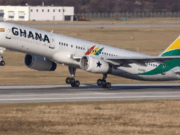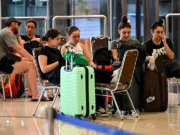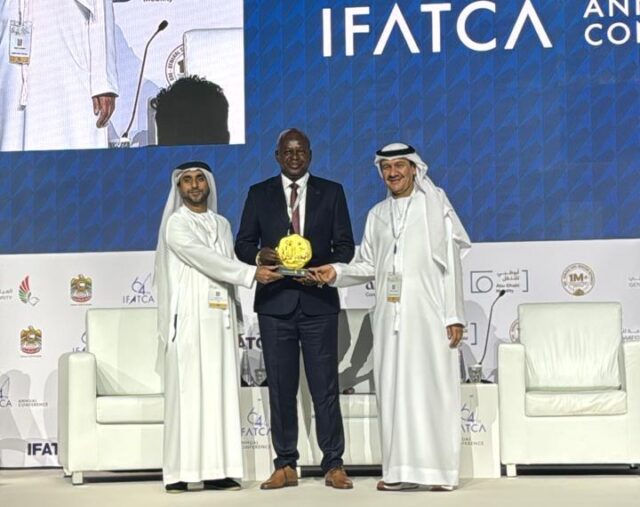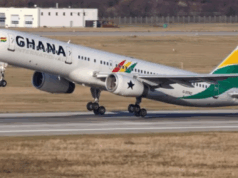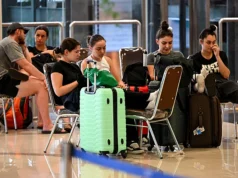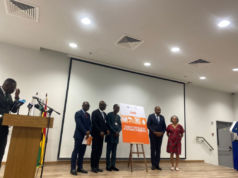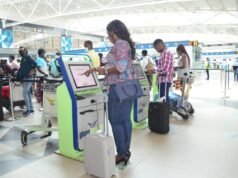Transport Minister Champions Human Capital At Global Aviation Forum | By Dominick Andoh | In a compelling address to global aviation leaders, Ghana’s Minister for Transport, Mr. Joseph Bukari Nikpe, called for renewed global emphasis on human capital development amid the rapid technological evolution shaping air traffic management systems.
The minister delivered his remarks during the opening of the 64th Annual Conference of the International Federation of Air Traffic Controllers’ Associations (IFATCA), held in Abu Dhabi, United Arab Emirates (UAE). Themed “Recruitment and Training: The Flight Plan for Our Future”, this year’s event placed the spotlight on workforce development and the critical role of air traffic controllers (ATCOs) in the future of global aviation.
Held from 28th April to 2nd May 2025 at the prestigious Abu Dhabi National Exhibition Centre (ADNEC), the IFATCA conference brought together a diverse gathering of air traffic professionals, industry pioneers, policymakers, and aviation stakeholders from around the world. This milestone edition marked the first time the conference was held in the Middle East, a region known for its strategic geographic positioning and forward-looking aviation investments.
In his address, Mr. Nikpe emphasised that even as the aviation industry invests in cutting-edge automation, AI, and digital infrastructure, the human workforce remains the backbone of safe and efficient operations.
“Our industry cannot afford to sideline the very people who interpret data, make life-saving decisions, and adapt under pressure in ways machines cannot. The future of air traffic management must be built not just on innovation but on investing in the men and women behind the radar screens,” the Minister remarked.
Drawing on Ghana’s own recent investments in aviation training and regulatory modernisation, Mr. Nikpe stressed the need for both policy alignment and international collaboration to support capacity building across developing and emerging aviation markets.
Global Recognition for Ghana’s Leadership
Mr. Nikpe’s presence at the IFATCA conference was not only as a speaker but also as an honoree. In a symbolic moment during the conference’s opening ceremony, Yousif Al Hammadi, President of the Emirates Aviation Association, presented Minister Nikpe with a special award of recognition on behalf of the international aviation community.
The award acknowledges Ghana’s consistent commitment to supporting air traffic management systems, including sustained improvements at Kotoka International Airport (KIA) and the regulatory backing offered to local and international carriers operating in Ghana.
“Ghana continues to stand out for its balanced approach to infrastructure, policy, and airline partnership. The Kotoka International Airport has become a preferred hub for many carriers, and that is no coincidence,” said Mr. Al Hammadi during the presentation.
The conference theme, “Recruitment and Training: The Flight Plan for Our Future,” struck a chord across panels and keynotes. With global air traffic returning to pre-pandemic levels and newer technologies being deployed, the demand for highly skilled air traffic controllers, systems engineers, and safety managers has never been greater.
Mr. Nikpe’s intervention aligned with the prevailing consensus that future-ready air traffic management will depend as much on human expertise as it will on automated systems. He underscored the importance of building domestic training ecosystems, including simulation facilities, digital curricula, and regional certification frameworks.
“It is no longer sufficient to rely solely on international training. Africa must invest in homegrown capacity to meet both regional and global standards,” he noted.
Ghana’s Evolving Role in African Aviation
Ghana’s aviation sector has been on an upward trajectory over the past decade. Under the oversight of the Ministry of Transport and implementation by the Ghana Civil Aviation Authority (GCAA) and the Ghana Airports Company Limited (GACL), the country has positioned itself as a regional leader in airport infrastructure, safety compliance, and traffic handling capacity.
Kotoka International Airport, Ghana’s primary gateway, has undergone multiple upgrades. Additionally, Ghana’s investments in regional airports, such as in Kumasi, Tamale, and Ho, underscore a strategic pivot towards decentralizing aviation traffic and enhancing national connectivity.
These developments—coupled with Ghana’s favorable geographic location in West Africa—make it a vital partner in shaping future continental and international aviation initiatives.
Hosting the conference in Abu Dhabi, the capital of the United Arab Emirates, was both symbolic and strategic. The UAE is globally recognised for its state-of-the-art aviation infrastructure, advanced traffic control systems, and world-leading carriers like Emirates and Etihad Airways.
ADNEC, the venue for this year’s conference, served as a vibrant hub for the high-level discussions.
Participants hailed from more than 90 countries, representing air navigation service providers (ANSPs), civil aviation authorities, international bodies like ICAO and IATA, and industry players such as Thales, Honeywell, and NATS.
Minister Nikpe used the opportunity to engage in bilateral discussions with counterparts from the Middle East, Europe, and Asia. Discussions focused on areas including technical cooperation agreements for training Ghanaian air traffic personnel, opportunities to co-develop aviation research programs, and leveraging Ghana’s strategic location as a regional aviation logistics hub.
In conversations with UAE aviation stakeholders, Minister Nikpe welcomed potential public-private partnerships that would expand training and maintenance infrastructure in Ghana while offering employment opportunities to Ghanaians across the aviation value chain, and investment in a new national airline for Ghana.
Ghana’s growing influence on the global aviation stage, underscored by the recognition awarded to Mr. Nikpe, is evidence that strategic leadership, even from smaller aviation markets, has a seat at the global table.
The International Federation of Air Traffic Controllers’ Associations (IFATCA) is a global organization representing over 50,000 air traffic controllers in more than 130 countries. Founded in 1961, the federation advocates for safety, professional development, and cooperation among air traffic professionals worldwide.
Transport Minister Champions Human Capital At Global Aviation Forum | AviationGhana


